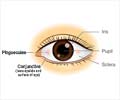- What Causes Dry Eyes? - (http://www.webmd.com/eye-health/eye-health-dry-eyes)
- Dry Eye Syndrome - (http://www.emedicinehealth.com/dry_eye_syndrome/article_em.htm)
About
Dry eye may be due to a decrease in tear production, alteration of the tear consistency, or faster evaporation of the tears.
The surface of the eye is normally kept moist by a thin tear film that consists of three layers, the innermost mucin layer which is secreted by the surface of the conjunctiva (the membrane lining the eye), a middle aqueous layer produced by the tear glands called lacrimal glands, and the outermost lipid layer produced by glands of the eyelids called the meibomian glands. Tears keep the eye moist, wash away any foreign particles from the surface of the eye and protect the eye from infection.

Dry eye is a condition where there is a decrease in tear production, an alteration in the consistency of the tears, or a faster evaporation of tears. A person with dry eyes may experience dry and scratchy feeling of the eyes, burning, itching, redness, a foreign body sensation, and light sensitivity.
Some features that may point to the cause of dry eyes are:
- A person who spends a lot of time in front of the computer with improper light can afflict strain to the eye causing dry eyes due to infrequent blinking. While working on the computer for long hours, it is recommended to blink regularly to reduce eye strain and dry eyes.
- A person taking medications may suffer from dry eyes due to the medication. A complete assessment of the patients’ medications is necessary.
- A person with dry eyes and mouth, and arthritis may be suffering from Sjogren’s syndrome.
The causes of dry eyes are listed below:
Conditions that decrease the production of the aqueous component of tears: Conditions that decrease the production of aqueous component of tears include:
- Older age: People at an older age experience a decreased secretion of tears.
- Hormonal changes: Women taking oral contraceptives especially estrogen-only pills are prone to suffer from dry eyes. Women after menopause may also suffer from dry eyes more often.
- Autoimmune diseases like Sjogren’s syndrome, rheumatoid arthritis and lupus: In people with autoimmune disease, the immune system acts abnormally and produces antibodies against its own organs. In Sjogren’s syndrome, antibodies are produced against the patient’s tear glands leading to dry eyes, salivary glands leading to dry mouth, and joints leading to arthritis.
- Medications: Medications like antihistamines, antidepressants, beta blockers, oral contraceptives, tranquillizers and Parkinsonism medications tend to decrease secretions resulting in dry eyes.
Conditions that increase evaporation of tears: These include:
- Activities that require extra eye attention: Activities that require extra eye attention like watching television or working on a computer may result in decreased blinking and an increase in evaporation of the tear film.
- Stroke and Bell’s palsy: Conditions like stroke and Bell’s palsy paralyze the eyelids. This results in decreased blinking and thereby increases the evaporation of the tear film.
Conditions that affect mucin production: Conditions that affect mucin production lead to poor spreading of tears on the surface of the eyes. These include:
- Chemical injuries of the eyes: Since the mucin layer is produced from the surface of the eyes, chemical injuries that affect the surface of the eye result in decreased mucin production. This leads to poor spreading of tears on the eye resulting in dryness.
- Stevens-Johnson syndrome: Stevens Johnson syndrome is a severe skin condition that occurs due to an allergic reaction to medications or an infection. It produces multiple skin sores and affects the eyes resulting in dry eyes.
- Autoimmune conditions like cicatricial pemphigoid: Cicatricial pemphigoid is an autoimmune condition with blisters and erosions on the mucus membranes including the eye. The lesions often heal with scarring. The tear gland may also be involved resulting in decreased tear secretion.
Conditions that affect the lipid layer: The lipid layer may be affected in conditions affecting the function of the meibomian glands. These include:
- Rosacea: Rosacea is a skin condition where the skin of the face appears red with bumps and pimples. The eyes also get irritated in this condition and appear watery and blood shot.
- Medications like isotretinoin: Isotretinoin dries up the eyes and destabilizes the tear film by altering meibomian gland function.
Frequently Asked Questions
1. Which doctor should I visit in case I suffer from dry eyes?
You should visit an ophthalmologist or eye doctor in case you suffer from dry eyes.
2. What are the possible treatments for dry eyes?
Artificial tear drops or ointments may provide relief from dry eyes. The punctum, a small opening on the inner side of the eyelids through which the tears drain, may be blocked either temporarily or permanently, to reduce drainage of tears. An eye drop that contains cyclosporine may be used to increase tear production in some cases. Corticosteroids may also be helpful. Local or systemic antibiotics may be useful in case of infection. A number of devices to increase the moisture of the eyes are also available for the treatment of dry eyes.







